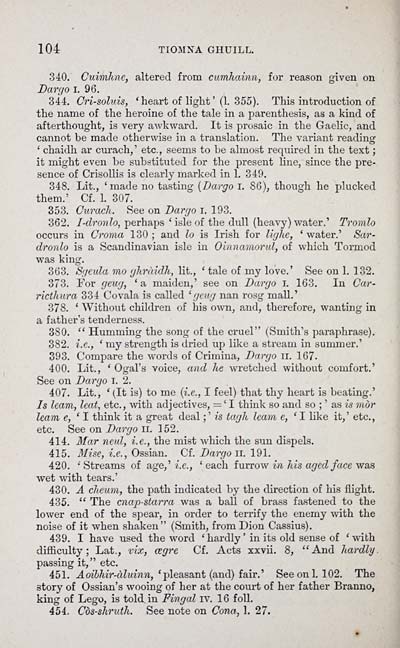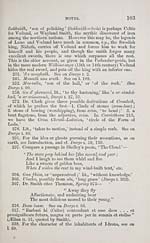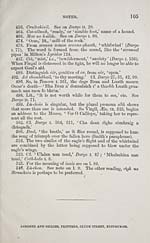Download files
Complete book:
Individual page:
Thumbnail gallery: Grid view | List view

104 TIOMXA GHUILL.
340. Cuimhne, altered from cumhainn, for reason given on
Bar (JO I. 96.
344. Cri-solids, * heart of light ' (1. 355). This introduction of
the name of the heroine of the tale in a parenthesis, as a kind of
afterthought, is very awkward. It is prosaic in the Gaelic, and
cannot be made otherwise in a translation. The variant reading
' chaidh ar curach,' etc., seems to be almost required in the text ;
it might even be substituted for the present line, since the pre-
sence of Crisollis is clearly marked in 1. 349.
348. Lit., ' made no tasting [Dargo I. 86), though he plucked
them.' Cf. 1. 307.
353. Curacli. See on Darcjo i. 193.
362. I-dronlo, perhaps ' isle of the dull (heavy) water.' Tromlo
occurs in Croma 130; and lo is Irish for lighe, 'water.' Sar-
dronlo is a Scandinavian isle in Oianamorul, of which Toi-mod
was king,
363. Sgeula mo ghraidh, lit., * tale of my love.' See on 1. 132.
373. For f/eug, 'a maiden,' see on Dargo i. 163. In Car-
ricthura 334 Covala is called ^ geitg nan rosg mall.'
378. ' Without children of his own, and, therefore, wanting in
a father's tenderness.
380. " Humming the song of the cruel" (Smith's paraphrase).
382. i.e., ' my strength is dried up like a stream in summer.'
393. Compare the words of Crimina, Dargo ii. 167.
400. Lit., ' Ogal's voice, and he wretched without comfort.'
See on Dargo i. 2.
407. Lit., '(It is) to me {i.e., I feel) that thy heart is beating.'
Is learn, Icat, etc., with adjectives, = ' I think so and so ; ' as is mòr
learn e, ' I think it a great deal ; ' is tagh learn e, ' I like it,' etc.,
etc. See on Dargo ll. 152.
414. 3far neul, i.e., the mist which the sun dispels.
415. Mise, i.e., Ossian. Cf. Dargo ii. 191.
420. •' Streams of age,' i.e., ' each furrow in his aged face was
wet with tears.'
430. A cheum, the path indicated by the direction of his flight.
435. " The cnap-starra was a ball of brass fastened to the
lower end of the spear, in order to terrify the enemy with the
noise of it when shaken" (Smith, from Dion Cassius).
439. I have used the word 'hardly' in its old sense of 'with
difficulty; Lat., vix, cegre Cf. Acts xxvii. 8, "And hardly.
passing it," etc.
451. -4 oiMiV-à^winn, 'pleasant (and) fair.' See on 1.102. The
story of Ossian's wooing of her at the court of her father Branno,
king of Lego, is told in Pingal iv. 16 foil.
454. Còs-shruth. See note on Cona, 1. 27.
340. Cuimhne, altered from cumhainn, for reason given on
Bar (JO I. 96.
344. Cri-solids, * heart of light ' (1. 355). This introduction of
the name of the heroine of the tale in a parenthesis, as a kind of
afterthought, is very awkward. It is prosaic in the Gaelic, and
cannot be made otherwise in a translation. The variant reading
' chaidh ar curach,' etc., seems to be almost required in the text ;
it might even be substituted for the present line, since the pre-
sence of Crisollis is clearly marked in 1. 349.
348. Lit., ' made no tasting [Dargo I. 86), though he plucked
them.' Cf. 1. 307.
353. Curacli. See on Darcjo i. 193.
362. I-dronlo, perhaps ' isle of the dull (heavy) water.' Tromlo
occurs in Croma 130; and lo is Irish for lighe, 'water.' Sar-
dronlo is a Scandinavian isle in Oianamorul, of which Toi-mod
was king,
363. Sgeula mo ghraidh, lit., * tale of my love.' See on 1. 132.
373. For f/eug, 'a maiden,' see on Dargo i. 163. In Car-
ricthura 334 Covala is called ^ geitg nan rosg mall.'
378. ' Without children of his own, and, therefore, wanting in
a father's tenderness.
380. " Humming the song of the cruel" (Smith's paraphrase).
382. i.e., ' my strength is dried up like a stream in summer.'
393. Compare the words of Crimina, Dargo ii. 167.
400. Lit., ' Ogal's voice, and he wretched without comfort.'
See on Dargo i. 2.
407. Lit., '(It is) to me {i.e., I feel) that thy heart is beating.'
Is learn, Icat, etc., with adjectives, = ' I think so and so ; ' as is mòr
learn e, ' I think it a great deal ; ' is tagh learn e, ' I like it,' etc.,
etc. See on Dargo ll. 152.
414. 3far neul, i.e., the mist which the sun dispels.
415. Mise, i.e., Ossian. Cf. Dargo ii. 191.
420. •' Streams of age,' i.e., ' each furrow in his aged face was
wet with tears.'
430. A cheum, the path indicated by the direction of his flight.
435. " The cnap-starra was a ball of brass fastened to the
lower end of the spear, in order to terrify the enemy with the
noise of it when shaken" (Smith, from Dion Cassius).
439. I have used the word 'hardly' in its old sense of 'with
difficulty; Lat., vix, cegre Cf. Acts xxvii. 8, "And hardly.
passing it," etc.
451. -4 oiMiV-à^winn, 'pleasant (and) fair.' See on 1.102. The
story of Ossian's wooing of her at the court of her father Branno,
king of Lego, is told in Pingal iv. 16 foil.
454. Còs-shruth. See note on Cona, 1. 27.
Set display mode to: Large image | Transcription
Images and transcriptions on this page, including medium image downloads, may be used under the Creative Commons Attribution 4.0 International Licence unless otherwise stated. ![]()
| Early Gaelic Book Collections > Hew Morrison Collection > Dàn an Deirg; agus, Tiomna Ghuill (Dargo and Gaul) > (134) |
|---|
| Permanent URL | https://digital.nls.uk/78801500 |
|---|
| Description | A selection of items from a collection of 320 volumes and 30 pamphlets of literary and religious works in Scottish Gaelic. From the personal library of Hew Morrison, the first City Librarian of Edinburgh. |
|---|
| Description | Selected items from five 'Special and Named Printed Collections'. Includes books in Gaelic and other Celtic languages, works about the Gaels, their languages, literature, culture and history. |
|---|

